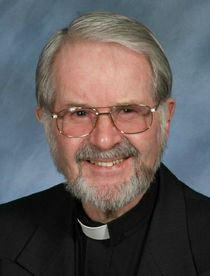
Faith
Informed Catholics have to start speaking up by introducing the topic of palliative care into neighborhood conversations.

McLaughlin
Is our human compassion being hoodwinked by the promoters of assisted suicide? Last October a Boston newspaper highlighted the issue with a front page story of Dr. Roger Kligler. Dr. Kligler had brought a suit against the commonwealth because he wanted to end his life. The details were highly emotional. I responded with a letter to the editor suggesting the doctor might want to consider palliative care. I have yet to see my letter in print.
In the process of mentioning it, I was surprised to learn that many of our people had not even heard of palliative care or knew what it meant. Then, earlier this month, in the same paper Kevin Cullen related the story of how his father died painfully 29 years ago. His article was titled "Giving Control to the Dying." His conclusion was that we should have assisted suicide legalized. I responded to him last week and await an answer.
It seems everybody knows what assisted suicide is, despite the wording used, and it may seem more compassionate. Suicide, no matter how it is packaged with names, is contrary to the Judeo-Christian tradition. God has told us not to kill. That includes suicide. However, in secularized society, we cannot use a religious argument. That community wants science and evidence. The scientific evidence is available from those countries or states that have legalized it. The evidence indicates that the procedure is against the common good. Just look at Europe's Low countries. Youngsters as young as 15 can request it, and their request is given serious attention. That is especially disconcerting here in our land wherein three million youths between ages 12 and 17 had depressive episodes in 2014. In Massachusetts, 34,000 patients under the age of 21 sought service for mental health issues. That was in 2016. Is that good for the community? Is it in the best interest of a person with a mental health condition to make such a decision? In Massachusetts, the Department of Mental Health is teaming up with the Department of Health and Human Services to develop a protocol that would be available to schools whose students may be in such straights.
No one wants a dying person to suffer pain. We would not want an animal to go through that. However, pain management has come a long way over the years. At this point, through palliative care, a patient can receive pain-killing medication that is increased in intensity and frequency as the pain increases. I saw this happen to a dear friend of mine last March. She had her good-byes and personal messages to family and loved ones before dying peacefully in her sleep.
Right now, in some states of our country where there is assisted suicide, some patients cannot afford the cost of their regular medication. However, they can get medication for suicide. Are we forcing them into unwanted suicide? Is that really what we want? Who benefits financially from the fact that they no longer receive expensive medication? And what about the disabled and the elderly? Will they be next? What about the Helen Kellers of our society who have so much to teach us. Are we a civilized society or not?
Last Sunday's Scriptures talked about us being the light of the world as disciples of Christ. Informed Catholics have to start speaking up by introducing the topic of palliative care into neighborhood conversations. We do not want to be blindsided. Somebody has to turn on the lights.
- Father McLaughlin is a senior priest of the Archdiocese of Boston in residence at St. Agatha Parish in Milton.
Recent articles in the Faith & Family section
-
Scripture Reflection for April 6, 2025, Fifth Sunday of LentFather Joshua J. Whitfield
-
Are there any saints who had a difficult relationship with the church?Jenna Marie Cooper
-
Holy Thursday and Good FridayFather Robert M. O'Grady
-
Faith is a verbArchbishop Richard G. Henning
-
Giving Mothers and Babies a Chance in the MissionsMaureen Crowley Heil























